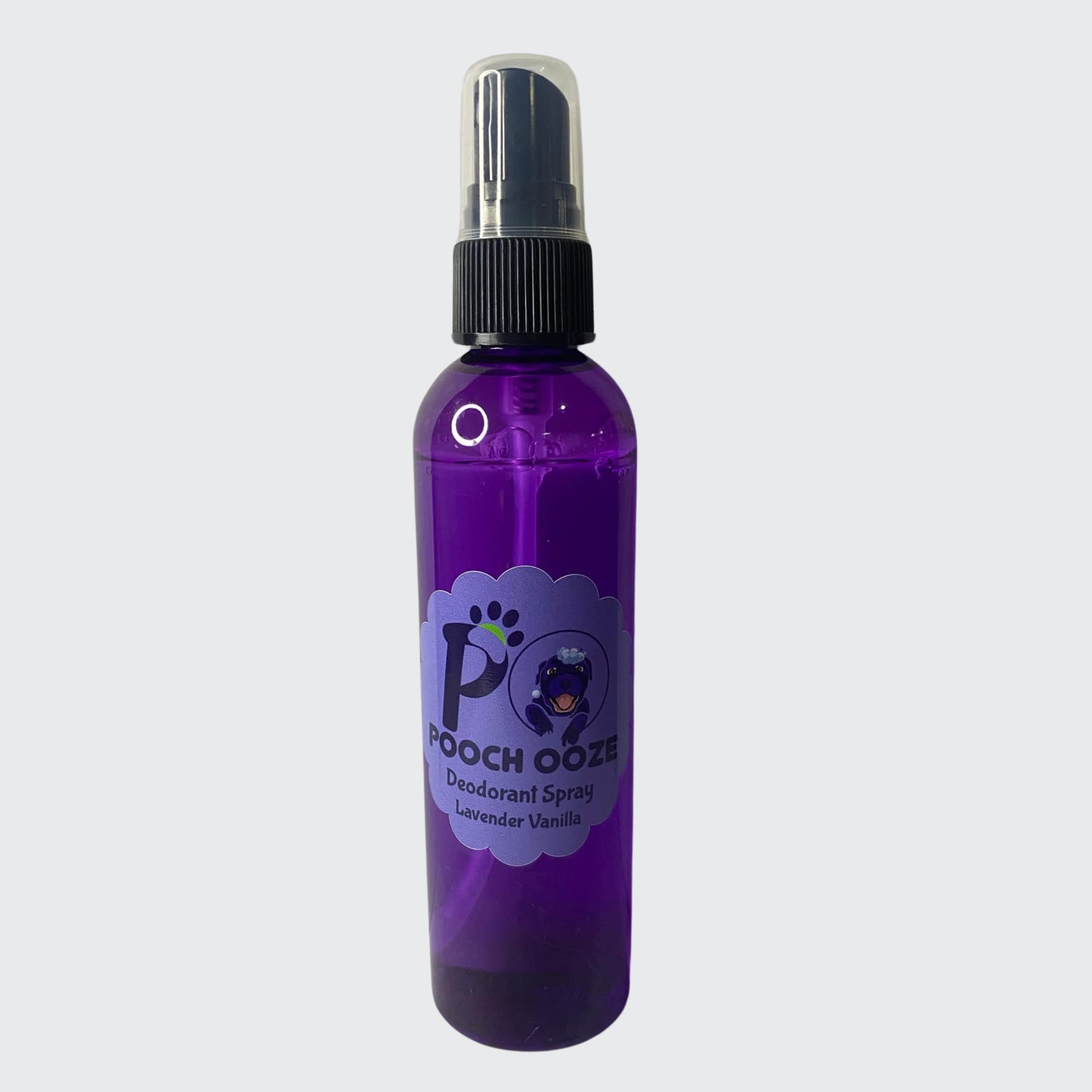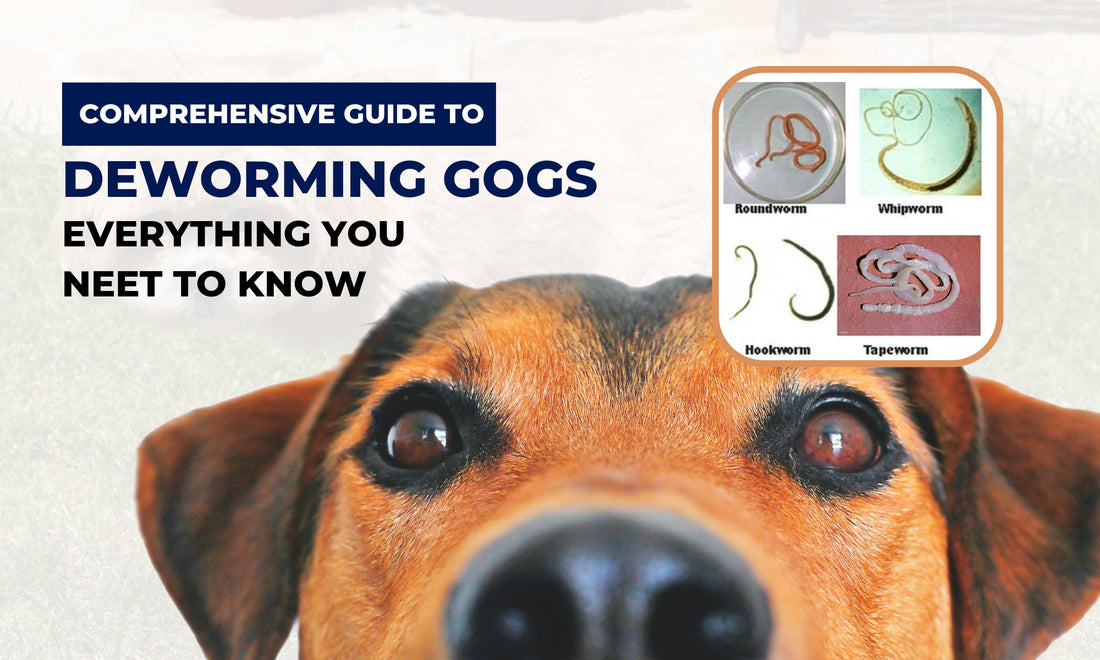Dogs can come into contact with internal parasites at any point in their lives, including before they are born. These parasites—which are often different types of worms—can cause problems once they find their way into your dog’s gastrointestinal (GI) tract. Depending on the parasite, your dog may experience symptoms, but this isn’t always the case. Deworming dogs is a key part of preventative measures, as is treating parasites if your dog has them.
Since dogs of any age are at risk, your veterinarian will recommend a deworming treatment plan that includes routine testing and treatment. This medication will help eliminate any current parasites as well as prevent your dog from getting parasites in the future.
In this article, we will provide you with detailed information on deworming dogs, including why it is essential, the different types of worms that can affect dogs, and the best practices for deworming. By the end, you'll have the knowledge and confidence to effectively safeguard your beloved canine companion.

Understanding the Importance of Deworming
Deworming plays a pivotal role in maintaining the overall health of your dog. Worms, if left untreated, can cause a wide range of health issues, including gastrointestinal problems, weight loss, anemia, and even more severe conditions in severe cases. Regular deworming helps prevent infestations, keeping your dog healthy and happy.
How Are Worms Transmitted in Dogs?
Puppies may enter this world carrying unwelcome passengers in the form of parasites, such as worms. Responsible breeders typically take precautions by checking the mother for any signs of worms, even if they may be dormant in her system. However, during pregnancy, the release of hormones can facilitate the transfer of worms to the puppies. It's important to note that parasites can be transmitted through blood during the fetal development stage and also through nursing.
The presence of parasites in dogs is not uncommon, as they often find themselves in environments conducive to parasite survival. Dogs may engage in activities like eating grass or ingesting feces, both of which can harbor parasites. These habits increase the likelihood of dogs acquiring worms through their oral intake. Furthermore, dogs have a natural curiosity and a tendency to explore places where other animals have defecated. If these animals happen to carry parasites, transmission can occur through this route as well.
When a dog ingests feces contaminated with parasite eggs, the worms can develop and thrive within its body. If both male and female worms are present in the gastrointestinal tract of the dog, the female worms will lay eggs, leading to an escalating problem if left untreated.
To address this issue, deworming treatment for puppies usually begins at a very young age, often before they even go to their new homes with their owners. It's crucial to consult your veterinarian to determine the appropriate timing for initiating a heartworm preventative and other deworming measures for your puppy. Taking proactive steps will help ensure the well-being of your furry companion and minimize the risk of parasite-related complications.
Types of Worms in Dogs
1. Roundworms (Toxocara Canis)
Roundworms are one of the most common types of worms that can affect dogs. These parasites can be transmitted to puppies through their mother's milk or through contact with contaminated feces. Adult roundworms reside in the intestines, and their eggs are passed in the dog's feces, which further contaminates the environment.
2. Hookworms (Ancylostoma Caninum)
Hookworms are another type of intestinal parasite that can cause significant harm to your dog's health. These worms attach themselves to the intestinal lining, causing irritation, blood loss, and anemia. Puppies can acquire hookworms through the placenta or by ingesting larva from the environment.
3. Whipworms (Trichuris Vulpis)
Whipworms are found in the cecum and colon of infected dogs. These worms can cause diarrhea, weight loss, and general discomfort. Dogs usually become infected by ingesting whipworm eggs present in contaminated soil or through contact with infected feces.
4. Tapeworms (Dipylidium Caninum)
Tapeworms are long, segmented parasites that attach themselves to the dog's intestines. They can be transmitted to dogs through the ingestion of fleas or by ingesting small mammals infected with tapeworm larvae. These worms can cause weight loss, irritability, and discomfort in dogs.
5. Heartworms (Dirofilaria Immitis)
Heartworms are a particularly dangerous type of worm that can be life-threatening to dogs. They are transmitted through the bite of infected mosquitoes and can affect the dog's heart and lungs. Heartworm prevention is crucial, and different preventive medications are available from your veterinarian.
Signs of Worm Infestation
Detecting the presence of worms in dogs can be challenging as symptoms may vary depending on the type of worm infestation. However, there are some common signs to look out for:
• Diarrhea
• Vomiting
• Weight loss
• Potbellied appearance
• Dull coat
• Lack of energy
• Itching and irritation around the anus
• Visible worms in feces or vomit
If you notice any of these signs or suspect your dog may have worms, it is vital to consult your veterinarian for proper diagnosis and treatment.
What to Do if You Think Your Dog Has Worms
If you suspect that your dog may be infected with worms, there are several steps you can take. In the event that your dog experiences loose stools, diarrhea, or noticeable changes in the appearance of their feces, it is advisable to schedule an appointment with your veterinarian. It would be beneficial to bring a sample of your dog's feces for examination to detect any signs of parasites.
Obtaining a Fecal Sample from Your Dog
In preparation for your veterinary visit, the night prior, your veterinarian will request that you collect a fresh stool sample from your dog. To achieve optimal results, we suggest utilizing a plastic spoon and a plastic container, often provided by your vet. It is advisable to store the container in the refrigerator overnight.
While it may be possible to obtain a more recent sample on the day of your visit, having a backup sample is always prudent. If your dog is experiencing diarrhea, the same technique of scooping with a plastic spoon and collecting as much feces as possible in a plastic container will provide us with a sample containing an adequate amount of fecal matter."
Given that these parasites can potentially cause illness in humans, it is crucial to exercise extra caution and thoroughly wash your hands after handling your dog's feces. If your dog has diarrhea and it comes into contact with their fur, it is advisable to bathe your dog while wearing gloves. These precautions contribute to maintaining hygiene and minimizing the risk of transmission.
Screening for Worms in Dogs
To determine the presence of worms, the veterinarian will scrutinize the fecal sample using a microscope. Once the sample is combined with a solution, any eggs from parasites will rise to the surface. Utilizing a specialized stain aids in the microscopic examination, enabling easier identification of the eggs.
The eggs of different parasites possess distinct appearances, allowing us to identify the specific type of worms without directly visualizing the worms themselves." However, it is important to note that there can be instances of false negatives in the test results. This can occur if the worms are not currently depositing eggs. "In such cases, the fecal specimen may be labeled as negative, but there is still a possibility of the presence of parasites.
How often should you deworm your dogs?
Deworming your dogs is an essential aspect of their overall healthcare routine. The frequency of deworming depends on various factors, including your dog's age, lifestyle, and environment.
Puppies: Puppies are often born with roundworms, so it's crucial to begin deworming early. Typically, puppies are dewormed at 2, 4, 6, and 8 weeks of age, followed by monthly treatments until they reach 6 months old. After that, a regular deworming schedule can be established based on your veterinarian's recommendation.
Adult Dogs: Adult dogs should be dewormed at least twice a year to maintain optimal health. However, if your dog has a higher risk of exposure to parasites, such as frequent contact with other dogs or outdoor activities, more frequent deworming may be necessary.
Pregnant Dogs: Pregnant dogs should be dewormed during gestation to prevent the transmission of parasites to their offspring. Consult your veterinarian for specific guidelines and safe deworming options for pregnant dogs.
Year-Round Prevention: In areas where heartworm disease is prevalent, a year-round heartworm preventive medication that also targets other common intestinal parasites is recommended. These medications can help protect your dog against heartworms, roundworms, hookworms, and sometimes even whipworms and tapeworms.
How do you know when a dog needs deworming?
Identifying the signs that your dog may need deworming is crucial for maintaining their health. Keep an eye out for symptoms such as diarrhea, vomiting, weight loss, a distended abdomen, or visible worms in your dog's stool. However, it's important to note that not all dogs display obvious signs of a worm infestation. Some dogs may exhibit no symptoms at all while still carrying internal parasites. That's why regular preventive deworming is recommended.
When should I deworm my dog?
The timing of deworming your dog depends on several factors. As mentioned earlier, puppies require more frequent deworming during their early months. Once they transition to an adult deworming schedule, it is typically advisable to follow the recommended frequency of deworming every three to six months. However, it's essential to consult with your veterinarian to determine the best timing for deworming based on your dog's specific needs and circumstances.
Should I deworm my dog before or after eating?
In general, it is recommended to deworm your dog on an empty stomach or before a meal. This is because certain deworming medications are better absorbed when the stomach is not filled with food. However, it's crucial to read and follow the specific instructions provided by your veterinarian or on the deworming medication packaging. Some deworming products may require administration with food to minimize the risk of stomach upset. Always consult with your veterinarian to determine the most appropriate method and timing for deworming your dog based on the specific deworming medication prescribed.
By understanding the appropriate frequency, recognizing signs, considering timing, and following proper administration guidelines, you can ensure that your beloved canine companion receives the necessary deworming treatments to maintain their optimal health and well-being. Remember to consult with your veterinarian for personalized advice tailored to your dog's needs.
Choosing the Right Deworming Treatment
There are various deworming treatments available on the market, and it's essential to choose the most effective option for your dog's specific needs. Here are some key factors to consider:
Consult Your Veterinarian: Your veterinarian is the best resource to determine which deworming treatment is most suitable for your dog. They will consider your dog's health, age, and risk factors to prescribe the appropriate medication.
Broad-Spectrum Coverage: Look for deworming treatments that offer broad-spectrum coverage, targeting multiple types of parasites. This ensures comprehensive protection for your dog against various worms.
Administration and Dosage: Consider the ease of administration and the correct dosage for your dog. Some dewormers come in tablet form, while others may be applied topically or injected. Ensure you follow the instructions carefully to achieve optimal results.
Safety and Side Effects: Take note of any potential side effects associated with the deworming treatment. While side effects are rare, it's important to be aware of any possible reactions and discuss them with your veterinarian.
Environmental Management
In addition to regular deworming, maintaining a clean and parasite-free environment is crucial to prevent reinfestation. Here are some practices to consider:
Regular Cleaning: Clean up your dog's feces promptly, as it may contain worm eggs or larvae. Dispose of the waste properly to avoid contaminating the environment.
Yard Maintenance: Keep your yard free from debris and regularly remove feces to minimize the risk of worm infestation. Consider treating your outdoor area with pet-safe products to control parasites.
Flea Control: Fleas can transmit certain types of worms to dogs. Implement a flea control program, including regular use of flea prevention products, to minimize the risk of infestation.
Hygiene Practices: Practice good personal hygiene, such as thorough handwashing after handling dogs or cleaning up after them. This helps prevent the transmission of parasites from dogs to humans.
Conclusion
Deworming is an essential aspect of responsible dog ownership. By understanding the different types of worms, signs of infestation, and implementing appropriate deworming protocols, you can protect your dog from the harmful effects of parasites. Remember to consult your veterinarian for professional advice tailored to your dog's specific needs. With regular deworming and a clean environment, you can ensure the well-being and happiness of your beloved canine companion.



